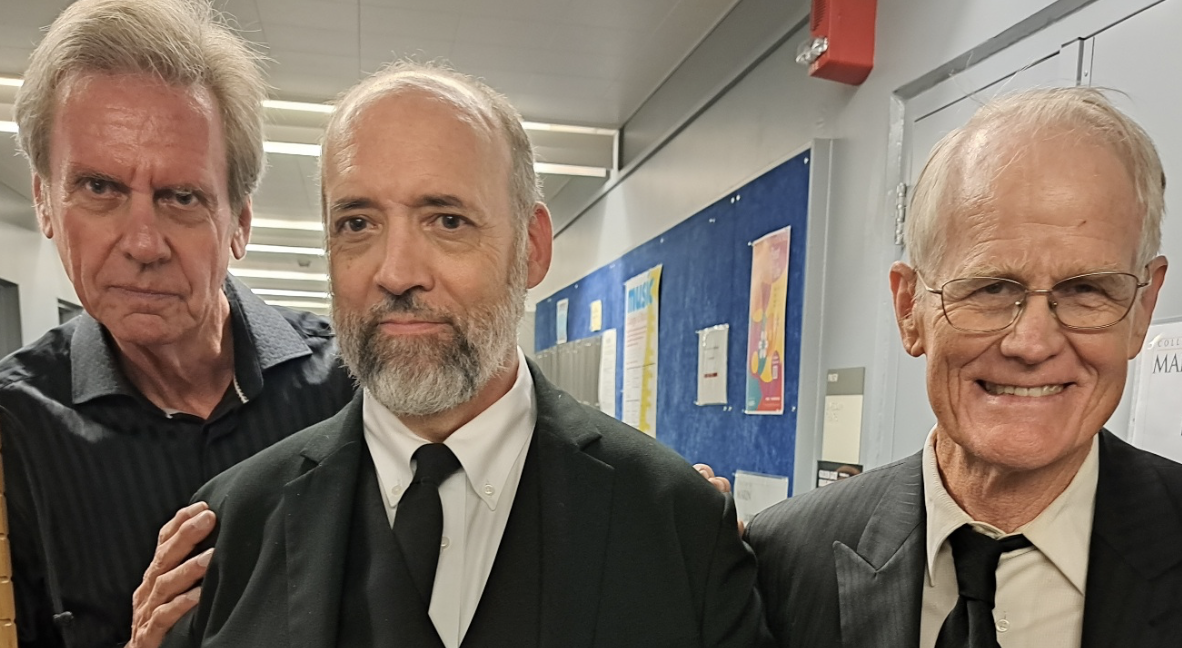|
Symphony
FROM THE NEW WORLD TO THE OLD WORLD
by Peter Lert
Saturday, June 14, 2025
Chamber
MC2 DUO RECITAL CLOSES 222'S SEASON
by Terry McNeill
Saturday, June 14, 2025
Choral and Vocal
CANTIAMO SONOMA'S LUSCIOUS A CAPELLA SINGING IN SEASON ENDING CONCERT
by Pamela Hicks Gailey
Sunday, June 8, 2025
Symphony
SRS SEASON ENDS WITH RESOUNDING TA-TA-TA-BANG
by Terry McNeill
Sunday, June 1, 2025
Symphony
YOUTHFUL VIRTUOSITY ON DISPLAY AT USO'S MAY CONCERTS
by Peter Lert
Saturday, May 17, 2025
Symphony
MYSTICAL PLANETS AND LIVELY GERSHWIN ORTIZ AT FINAL SRS CONCERT
by Peter Lert
Sunday, May 4, 2025
Symphony
VSO'S CONCERT MUSIC OF TIME, MUSIC OF PLACE
by Peter Lert
Sunday, April 27, 2025
VOCAL ELEGANCE AND FIRE AT THE 222'S RECITAL APRIL 26
by Pamela Hicks Gailey
Saturday, April 26, 2025
CANTIAMO SONOMA SINGS AN INSPIRED GOOD FRIDAY MOZART REQUIEM CONCERT
by Pamela Hicks Gailey
Friday, April 18, 2025
DRAMATIC SHOSTAKOVICH SYMPHONY CLOSES PHILHARMONIC'S 25TH SEASON
by Terry McNeill
Sunday, April 13, 2025
|
 |
|
OPERA REVIEW
Contemporary Opera Marin / Saturday, July 20, 2024
Paul Smith, director. Kristine Browne, flute; Shelly Hodgkin, clarinet; Josh Darr, violin; Myra Chachkin, cello; Mick Laugs, narrator; Erin McBride Africa, mime; Vicki Marinko and Sarah Shockley, sopranos; additional singers TBA
|
 P. Smith C. Pilcher C. Hammond (A. Wasserman photo) |
SATIRICAL MUSIC, DARK TIMES
by Abby Wasserman
Saturday, July 20, 2024
Contemporary Opera Marin director Paul Smith introduced the program of two little-known mini-operas July 20 in the College of Marin’s James Dunn Theater. Behind him the set was simplicity itself: chairs, a desk, a lamp. A small band of instrumentalists: Kristine Browne, flute; clarinetist Shelly Hodgkin; Josh Darr, violin, and cellist Myra Chachkin, sat in readiness while the cast of twenty or so singers waited in the wings.
I’ve come to appreciate Mr. Smith’s mounted staged readings of largely obscure operas performed by community volunteers and professionals. The two offerings were more topical than most: works from the troubled 1940’s by Hans Gál and Shostakovich, each a musical satire with librettos from real life events of the time. Gál’s journal was from an internment camp in What a Life (1940), and text from official Soviet speeches that decried contemporary music informed Shostakovich’s Rayok - Anti-Formalist (1947). Mr. Smith introduced the background, took his seat at the piano, and Gál’s episodic cabaret opera began with Dan Schwager in the persona of Gál himself reading from the journal, as the cast, playing bewildered refugees, entered to a circus-like march.
A renowned Jewish composer in Vienna, Gál was forced to flee during Hitler’s anti-Semitic purges, was interned on the Isle of Man, and upon release lived and worked in Scotland the rest of his life. Much of his music has yet to be discovered by a wide musical audience.
What a Life satirizes the bureaucratic practices of the internment camp’s overseers. The music is ironic, jaunty and sometimes poignant, underscoring the tedium of camp life with its inane rules and regulations. The composer was a character in the play, portrayed by a string of company members who donned a pair of round-lensed glasses to introduce ten different musical numbers. My favorites were “Song of the Barbed Wire,” “Song of the Double Bed,” the longer “Ballad of the German Refugee” (in which each company member told a story in turn), and “Ballad of Poor Jacob,” about a stateless Jewish boy mistreated in every country he enters, narrated by Mick Laugs and eloquently mimed by Erin McBride Africa. “Keep Fit,” sung by Vicki Marinko and Sarah Shockley, was a tuneful and charming duet about obligatory exercise.
The staging of the musical numbers was spare but effective. The voices ranged in quality, but each cast member had a chance to sing or recite, and the performance was thoroughly engaging.
Like other artists under the Soviet system, Shostakovich lived on the knife edge between official approbation and the constant threat of imprisonment if there was official disapproval of his compositions. Written in secret, Rayok - Anti-Formalist is a brilliant, pointed mini-opera that wickedly satirizes the government’s curtailment of experimentation with music. It’s part lecture, part melodrama and all pomposity, with text from actual speeches by Communist Party officials against “formalist” music. Calling anything adventuresome and new “against the people,” the singers exhorted their captive listeners (sitting in jump suits painted with geometric designs by costumer Elise Cheval) to write only “exquisite and virtuous, beautiful and elegant” music like Glinka, Tchaikovsky and Rimsky Korsakov. The four soloists - the party chairman and three party functionaries (dubbed Dvoikin, Yedinitsyn, and Troikin) were splendidly sung by Chris Pilcher, Mr. Schwager, Christopher Hammond (hilarious!) and Rick Wallace, who after completing his sung exhortations, broke into impressive Cossack dancing with traditional knee-bending and thigh-slapping moves, all executed with a straight face, which made it funnier.
Rayok - Antiformalist was not performed publicly during the composer’s life, and only close friends were privy to snippets of it shared in secret gatherings. This production, staged by Mr. Wallace, was exhilarating.
Juice and cookies were served in the theater hallway after the performance, along with discussion about College of Marin’s recently cancelled opera program. Contemporary Opera Marin, which the college partially supported for 25 years, has now formed a nonprofit for future artistic productions.
|

